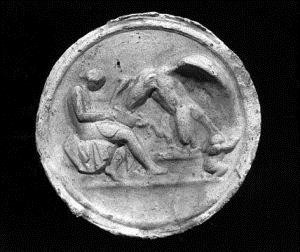 Welcome to the One Verse podcast, where we liberate Scripture from religion, one verse at a time.
Welcome to the One Verse podcast, where we liberate Scripture from religion, one verse at a time.
Episode #00 Highlights
- The One Verse Podcast will feature verse-by-verse expository teaching of Scripture, with a target goal (that will rarely be accomplished) of one verse per episode in five minutes or less.
- The Goal of the One Verse Podcast is to liberate Scripture from religion, one verse at a time.
- Things I will focus on in bringing out from each verse:
- Historical/Cultural Context
- Scripture as a Grand Narrative
- The Crucivision Way of Reading Scripture
- Liberty from Religion
Resources Mentioned in this Episode:
- Logos Bible Software
- Logos Master Journal Bundle
- Jesus Told Stories, So Shouldn’t We!
- Subscribe and Leave a Review on iTunes
![[#00] One Verse Podcast Introduction](https://redeeminggod.com/wp-content/uploads/2015/09/One-Verse-at-a-Time-150x150.jpg)

 But even if the text is referring to a gay couple in bed, and even if the text does teach about the rapture, I pointed out to him that one of the men was taken in the rapture, which means that apparently, God accepted him.
But even if the text is referring to a gay couple in bed, and even if the text does teach about the rapture, I pointed out to him that one of the men was taken in the rapture, which means that apparently, God accepted him. Immediately before the mention of two men in one bed is a lengthy discussion of the destruction of Sodom. Now I don’t believe the sin of Sodom was homosexuality. But there are many today who believe that it was, and I think most of the Jewish believers in Luke’s audience may have believed it as well.
Immediately before the mention of two men in one bed is a lengthy discussion of the destruction of Sodom. Now I don’t believe the sin of Sodom was homosexuality. But there are many today who believe that it was, and I think most of the Jewish believers in Luke’s audience may have believed it as well. Plutarch (ca A.D. 45 to 120) was born in Greece near Delphi, and was a contemporary of Luke. One of Plutarch’s s, “The Banquet of Seven Wise Men,” is a fictional conversation among some famous men who lived around 650 BCE. After a brief lull in the conversation, Thales of Miletus speaks:
Plutarch (ca A.D. 45 to 120) was born in Greece near Delphi, and was a contemporary of Luke. One of Plutarch’s s, “The Banquet of Seven Wise Men,” is a fictional conversation among some famous men who lived around 650 BCE. After a brief lull in the conversation, Thales of Miletus speaks: A major piece of evidence supporting the thesis of a deliberate gay theme in Luke’s Small Apocalypse (which I call “Luke’s Gay Apocalypse”) is found in the two primary symbols of Zeus, the supreme god in Roman religion. The symbols of Zeus are the lightning bolt and the eagle, and they appear in Luke 17:24, 37.
A major piece of evidence supporting the thesis of a deliberate gay theme in Luke’s Small Apocalypse (which I call “Luke’s Gay Apocalypse”) is found in the two primary symbols of Zeus, the supreme god in Roman religion. The symbols of Zeus are the lightning bolt and the eagle, and they appear in Luke 17:24, 37. According to the story, the attractive young Ganymede is abducted by an eagle, who in one version is Zeus himself, having transformed himself into an eagle. While the story had several uses (as a paradigm for imperialism and an allegory for Truth), in the Roman era the sexual nature of Ganymede’s relationship with Zeus was widely recognized.
According to the story, the attractive young Ganymede is abducted by an eagle, who in one version is Zeus himself, having transformed himself into an eagle. While the story had several uses (as a paradigm for imperialism and an allegory for Truth), in the Roman era the sexual nature of Ganymede’s relationship with Zeus was widely recognized. What we have here are the two chief symbols of Zeus, lightning and eagles, one of which is vividly associated with Zeus’ same-sex relationship with Ganymede, located at the beginning and end of a discrete unit of the third gospel, Luke’s Small Apocalypse. That distance between the verses may seem great, and this distance has obscured their historical and cultural connection. But these were the symbols of Zeus. If we were to read a paragraph that opened with a mention of a “crown of thorns” and ended with a “cross,” no one would doubt that the crucifixion was a central element in that paragraph.
What we have here are the two chief symbols of Zeus, lightning and eagles, one of which is vividly associated with Zeus’ same-sex relationship with Ganymede, located at the beginning and end of a discrete unit of the third gospel, Luke’s Small Apocalypse. That distance between the verses may seem great, and this distance has obscured their historical and cultural connection. But these were the symbols of Zeus. If we were to read a paragraph that opened with a mention of a “crown of thorns” and ended with a “cross,” no one would doubt that the crucifixion was a central element in that paragraph.


 Of course, such divisions over the role of the Mosaic Law in the life of the Christian are not new. This was actually one of the first and primary theological issues to create division within the early church. From the very beginning, there were questions about whether or not Gentile Christians had to obey the Mosaic Law (Answer: No. See Acts 15). As Paul went about teaching the Gospel, he constantly faced opposition from a set of Christians who believed that to truly follow Jesus, you had also obey the Mosaic Law. Even the Apostle Peter seemed to side with this group for a while (see Galatians 2).
Of course, such divisions over the role of the Mosaic Law in the life of the Christian are not new. This was actually one of the first and primary theological issues to create division within the early church. From the very beginning, there were questions about whether or not Gentile Christians had to obey the Mosaic Law (Answer: No. See Acts 15). As Paul went about teaching the Gospel, he constantly faced opposition from a set of Christians who believed that to truly follow Jesus, you had also obey the Mosaic Law. Even the Apostle Peter seemed to side with this group for a while (see Galatians 2). But even when we think about more mundane laws, like the tax code, or campaign finance law, or even the laws about the speed you can drive or the legal drinking age, all of these laws have stories behind how they became laws.
But even when we think about more mundane laws, like the tax code, or campaign finance law, or even the laws about the speed you can drive or the legal drinking age, all of these laws have stories behind how they became laws. Of course, when laws are created as a substitute for love, people think that what is important is obedience to the law, rather than learning to love. And then they look for loopholes in the law which allows them to live selfishly and dangerously (not in love) while still obeying the letter of the law. When this happens, more laws are created to top this selfish and dangerous behavior. And pretty soon, 10 laws become 600 laws which become 6000 laws, which become 60,000 pages of laws.
Of course, when laws are created as a substitute for love, people think that what is important is obedience to the law, rather than learning to love. And then they look for loopholes in the law which allows them to live selfishly and dangerously (not in love) while still obeying the letter of the law. When this happens, more laws are created to top this selfish and dangerous behavior. And pretty soon, 10 laws become 600 laws which become 6000 laws, which become 60,000 pages of laws. This pattern of separation from God which leads to further religion continues throughout the Pentateuch. After the Israelites reject the relationship from God, they are given the 10 commandments. But then they create the golden calf and worship it instead of God, and so they are given more laws with greater degrees of intricacy and duty (Exodus 32ff). Later, however, they are found guilty of making sacrifices to demonic idols (Lev 17:7ff), and so God adds further laws and regulations about the sacrificial system. In the Pentateuch, the 10 laws eventually get amplified into over 600.
This pattern of separation from God which leads to further religion continues throughout the Pentateuch. After the Israelites reject the relationship from God, they are given the 10 commandments. But then they create the golden calf and worship it instead of God, and so they are given more laws with greater degrees of intricacy and duty (Exodus 32ff). Later, however, they are found guilty of making sacrifices to demonic idols (Lev 17:7ff), and so God adds further laws and regulations about the sacrificial system. In the Pentateuch, the 10 laws eventually get amplified into over 600.
 I wrote previously about
I wrote previously about 
 Furthermore, the “older son” is the worst kind of “lost son” because we think we have stayed with God our Father, when in reality, we have gone into the far country of religion, which allows us to look down our self-righteous noses at everybody else who is not good enough, smart enough, or disciplined enough to truly live for God.
Furthermore, the “older son” is the worst kind of “lost son” because we think we have stayed with God our Father, when in reality, we have gone into the far country of religion, which allows us to look down our self-righteous noses at everybody else who is not good enough, smart enough, or disciplined enough to truly live for God.  The younger son only gets his party when he realizes how much he has screwed up and how much his father loves and forgives him. That’s when the party begins for him.
The younger son only gets his party when he realizes how much he has screwed up and how much his father loves and forgives him. That’s when the party begins for him. 